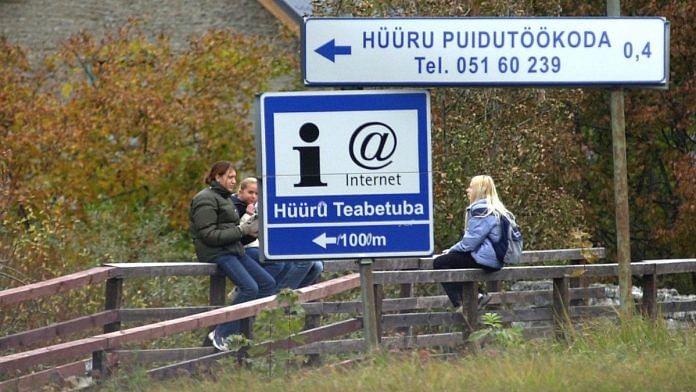The pandemic has seen a proliferation of digital bureaucracy, adding to the inconveniences of everyday life and travel.
Perhaps all the new apps, QR codes and endless clicking haven’t fazed the web wizards. But what of the millions of digital dinosaurs like me who don’t worship our gadgets? If even my nimble children stumbled down the rabbit hole of the British government’s online Passenger Locator Form and failed to find the right Covid PCR test providers due to badly designed IT, what chance do I have?
One answer is go to Estonia, the Baltic republic with a tiny population (just more than 1.3 million people), high-tech achievements and more vaulting international ambitions. Here you can become a naturalized digital citizen, with instant access to all the state’s services, without a geek’s expertise.
“For everybody under the age of 35, digital comes naturally. For everybody else it goes against nature,” says Kaja Kallas, Estonia’s prime minister, who I visited in Tallinn, the capital of the Baltic’s “Digital Republic,” last week.
Kallas, often compared to the unstuffy prime minister Birgitte Nyborg in the Danish TV drama Borgen, answers questions in English more fluently than Boris Johnson at the House of Commons Despatch box. Whereas the U.K. prime minister spouts Churchill-isms, she quotes from The Hitchhiker’s Guide to the Galaxy.
Although her family played a leading role in both of Estonia’s independence movements from neighboring Russia, in 1919 and 1991, Kallas has her eyes fixed firmly on the future. She’s championing a national project to overcome the great digital divides that arise from generational differences (my recently deceased mother in her nineties couldn’t operate a mobile phone) as well as socioeconomic ones. Her goal is to narrow the gap between the analogue oldies and digital youth.
I could do with Kallas’s help too. I am easily bored by form-filling and I make frequent mistakes on tiny keyboards.
Yet during the pandemic, technology has been the only way for millions of us to communicate with our friends, family, colleagues and communities. The digital future looks closer than ever. But most of us want our transactions with government, welfare services and business simplified, so that a forgotten password or errant keystroke doesn’t feel like a looming disaster.
In the U.K., however, there are more than a hundred different sites to log into to access government services — whether it’s the National Health Service portal for medical concerns or the Government Gateway for tax and benefits. Your day can be spent trying to dig up and sort through log-in details. It’s password hell out there.
Compare this with Estonia, which has a one-stop digital shop for services. You can easily file your taxes online (“tax attorneys are out of a job here,” jokes Kallas), get drug prescriptions, book hospital treatments, and fix residency details and identification digitally without a physical ID card. You can even vote online — a feat that other democracies have found forbidding.
What about something more complex, like renewing a passport? In Estonia, you don’t even need to remember to apply. The authorities remind you six months before your passport expires, and they fill in the renewal form for you — and all you have to do is download a new photo. It’s a great example of the “once only principle” where private citizens and businesses only have to give information once.
Taken together, these measures save approximately 2% of national GDP in bureaucratic time-wasting — a percentage that handily matches Estonia’s defense commitment to NATO (the Russians are still the old-fashioned threat to this emerging digital utopia). And private data is secure, courtesy of blockchain technology. There is no central database but systems are interoperable and all citizens have the right to see their personal information as it’s recorded and used by the government.
And you don’t have to emigrate in person to enjoy the benefits. People can become e-citizens of the Digital Republic from wherever they are. Up to 54,000 foreigners have applied for a government digital identity under the e-residency scheme, which allows people to conduct business in the country and access all the country’s simplified digital services.
That’s handy for small British companies selling into Europe as well as giant U.S. corporations. The U.K.’s departure from the single market has gummed up exports at the borders with form filling, delays and red tape. Many entrepreneurs have set up e-residency in Estonia to avoid the sort of foul-ups that have recently been making headline news in the U.K., such as shortages of chickens at Nandos to milkshakes at McDonalds.
Estonia’s private sector, invigorated by the success of Skype, its first local tech unicorn, has lent its expertise to the state to help effect many of these changes. Now it’s moving fast to make everyday life more convenient too.
For instance, one of the most trying ways to begin a holiday after a long flight is to join the snaking queue at a kiosk for rental car services to pick up a car. In Tallinn, my wife and I tapped our ride-hailing Bolt app to locate a car nearby, walked over to it, touched the Bolt app again to open the door and turned the key waiting in the ignition. In less than ten minutes, we were able to drive off without breaking a sweat.
The great leaps in digital technology of the last two decades have made my life and those of others richer and more varied. But it is high time to take the drudgery out of e-government and e-commerce.
Small Estonia punches above its digital weight. Yes, bigger countries have more complex systems and knottier challenges. But if the energy behind the Baltic state’s digital ambitions has rubbed off on a reluctant techie like me, it might be worth more governments on either side of the Atlantic paying attention to it.–Bloomberg
Also read: Covid-19 pandemic: New Zealand reports 1st death linked to Pfizer shot, Singapore most vaccinated



